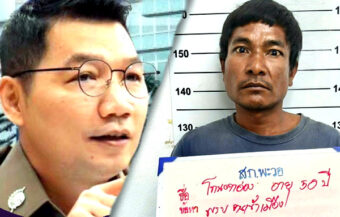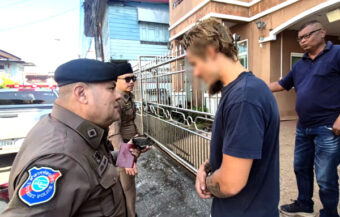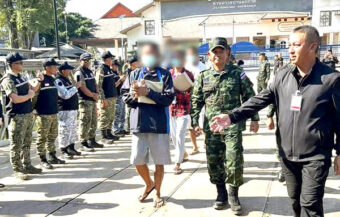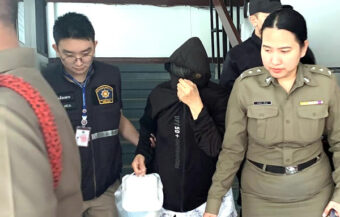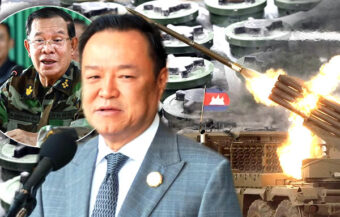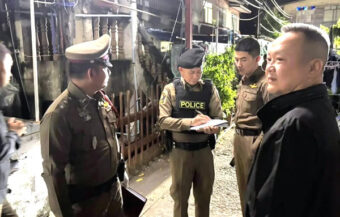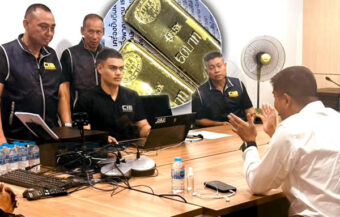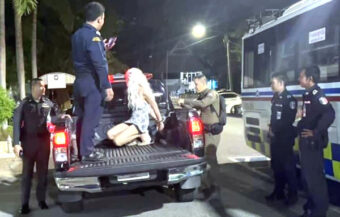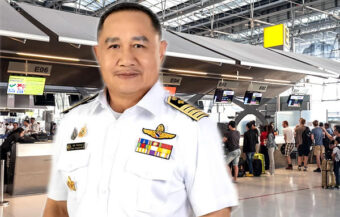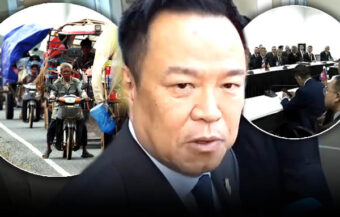The Ukraine war and the unprecedented resolve of western countries to sanction Russia even while sacrificing their individual economic interests, make it crystal clear that the western world has changed. A terrifying new prospect has now emerged for countries, particularly in Asia, that have operated at a democratic deficit or based on ‘realpolitik’ in the cosy world of diplomatic accommodations. They are now faced with a united and overwhelming resolve in the West, driven by younger and more idealistic voters, to do what is right at all costs. This has deep implications for Thailand first and foremost in terms of inward economic investment and also increasingly, at a geopolitical level, as tensions between the West and communist China continue to rise.
The controversial replacement of the Director of a Thai national TV station this week exposes rising tensions at the heart of the establishment linked to the kingdom’s position in relation to the Russian invasion of Ukraine, an event that is now dominating the country’s immediate economic future and threatens to have further repercussions as geopolitical tensions worldwide and most particularly in Asia, have shifted significantly due to the outcome of the war meaning it may now no longer be possible to practice the art of realpolitik and detente in a world that is increasingly divided between democratic powers supporting human rights and those which are more autocratic.
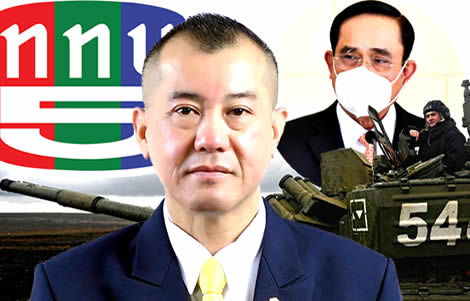
The tension in Thailand and rift over the kingdom’s position concerning the Russian invasion of Ukraine on February 24th broke through onto the country’s TV waves on Monday at midday when a news programme reporting on the country’s military-owned Channel 5 TV as it detailed the latest news on the conflict in Europe was abruptly shut down during the main midday news presentation.
On Tuesday, the Director of the TV station, General Rangsee Kitiyanasap, announced his resignation to the media despite denying such a move only 24 hours previously.
Military TV station boss explained to reporters that he had resigned voluntarily, General Rangsee said the media could form its judgement as to why
General Rangsee, reportedly a close friend and former classmate of the Royal Thai Army chief General Narongphan Jitkaewtae, later told reporters that he had voluntarily decided to resign and had submitted his resignation to the board’s chairman, General Narongphan, the day before but dared not reveal it publicly until it had been accepted.
When asked if his resignation was linked to the controversy over the TV station’s coverage of the Russian invasion of Ukraine, he replied that the answer to that question was a matter for the media to form its judgement upon.
Thai Prime Minister Prayut Chan ocha denied any involvement in the removal of the Channel 5 boss
The fallout from the friction over the TV station’s coverage of the war led to Prime Minister Prayut Chan ocha denying any involvement in the resignation of the army station director.
It was also reported that the independent news organisation, Top News TV, seen as a pro-government news agency which produces skilfully created content and which has hundreds of thousands of followers in Thailand, will also be withdrawing from a contract negotiated with General Rangsee to provide news programming to the TV service from March 31st. However, no such move has been confirmed officially.
The current situation is that General Rangsee is to be replaced by Lieutenant General Wisanti Srasida, the Army Training Command chief, in the role from April 7th next.
Lieutenant General Wisanti is reported to be scheduled to retire from army service in six months.
Show pulled mid stream while being broadcast on Monday as tensions reached boiling point on AIR
Top News had been involved in the on-air news presentation on Monday, March 28th which was simply cut in midstream as management pressure over what the station should be reporting is said to have boiled over.
It is understood that the issue had been the subject of ongoing, contentious meetings and acrimony at the station after the war began while the government’s stance on neutrality was made clear.
The unprecedented level of viewer interest in the war in Ukraine across the world and a unified, virulent anti-Russian feeling from western media and audiences have heightened pressure on Thailand at all levels.
It is understood that General Rangsee was instrumental in hiring the news service to provide content to the TV station which has a limited although loyal viewership in Thailand.
Channel 5 is a relatively small TV station in Thailand ranking at the bottom end of the ratings table
Channel 5 TV, based in the Phaya Thai district of Bangkok, is the second oldest TV service in the kingdom and was established in 1958.
It broadcasts a live TV service with a digital signal across the kingdom and into areas that overlap the kingdom’s borders with other countries in Indo China.
It provides a full spectrum TV service including TV shows, dramas and current affairs but has struggled in terms of ratings.
In the last TV ratings schedule to the 28th March 2022, Channel 5 came in ranked as number 17 with a TV rating of 0.027 which suggests access to 575,000 households while the leading TV station in the kingdom, Channel 7, had a rating of 1.516, giving it access to 32.29 million households both within and without Thailand.
Channel 3 is the second most-watched TV service with a TV rating range of 0.9 to 1.2.
Officially, Thailand has only 21.3 million TV households.
Outgoing TV boss tried to balance coverage of the war, signed pacts with Russian and Ukraine missions
The outgoing TV station chief has found himself embroiled in controversy during his tenure first of all due to his decision, at the beginning of 2022, to partner with Top News TV, the pro-government news agency with a strong audience of its own in Thailand, concerning the station’s news coverage.
After hostilities between Russia and Ukraine commenced on February 24th, he liaised with the Russian ambassador to Thailand, Mr Yevgeny Tomikhin who has been active in Bangkok since the outset of this war in underpinning the kingdom’s long-standing friendship with Russia and the relationship between Moscow and Bangkok.
It is still being reported that Russian President Vladimir Putin will visit Bangkok for the Asia-Pacific Economic Cooperation Summit of 21 countries in the Asia Pacific to be held from the 14th of November to the 19th of November 2022.
General Rangsee is understood to have signed an agreement with the Russian Embassy to report the war to the public in Thailand via Channel 5 in a more balanced manner compared to western media which is also at odds with media censorship and output in China, behind the communist country’s great firewall.
It is understood that the agreement envisaged Channel 5 staff verifying reports with the Russian mission in Bangkok before going to air.
A similar agreement was also, of late, signed with the Ukrainian mission in Bangkok.
General Prayut in a message to all Thai media asked for less analysis as well as consideration for Thailand’s image abroad and neutral status
On Tuesday, the Prime Minister, underlined an injunction placed on the station to report impartially as he denied that he was involved with the removal of the Channel 5 TV chief.
‘I am not involved because I am not the army chief anymore,’ he told reporters although he did concede that the government’s policy on neutrality extended to Channel 5. He said that does include how the conflict in Ukraine is reported.
General Prayut made it clear that it was also incumbent on all media in Thailand, reporting what he observed was a war in another region of the world, to refrain from over scrutinising the situation.
‘I’m referring not only to TV Channel 5 but also to others. Excessive analysis will cause problems to the overall image of our country,’ he said.
War in Ukraine severely impacting the Thai economy
However, this war in another region of the world has already severely impacted Thailand’s economy with Siam Commercial Bank, on Wednesday, warning that a prolonged conflict in Ukraine may drive Thailand’s inflation rate to 6.3%.
It has also hit the country’s critically important and still struggling foreign tourism industry which has been severely impacted.
In January 2022, 23,760 Russian tourists entered Thailand, the largest volume from any country and the Russian Federation sent up 1.56 million tourists in the last record year for the industry in 2019.
Russia sends more foreign tourists to Phuket than any other country says Phuket Tourist Association
A combination of biting sanctions, a lower ruble, rising inflation and international hostility towards Russia, driven by western countries, has lowered the number of Russian visitors travelling abroad.
Tourist industry chiefs in Thailand have strongly urged the government to maintain its neutral policy and are supportive of the stance taken by it on the matter.
Younger generation in Thailand sees a clear parallel between Ukraine’s struggle against Russia and the situation in Myanmar, Taiwan and Hong Kong
On the other hand, younger people in the kingdom especially among the educated and active, have drawn a parallel between the plight of Ukrainians struggling against a larger country attempting to oppress it and the increasingly bloody situation in Myanmar where the public is struggling against the military junta there as well as the struggle for democracy and human rights in Hong Kong and the plight of Taiwan in its standoff against China.
A second war raging in Myanmar unlike anything seen since World War Two with over 12,000 dead
The hyper reaction from the government concerning the question of media coverage in Thailand illustrates clearly that there are tensions at play due to a shift in the western world that has emphasised geopolitical fault lines.
There is now a very real prospect that western democratic policy and outlook, since the Biden Presidency began, is moving towards dividing the world into two spheres between the forces of autocracy on one hand, and democracy on the other.
This theme is increasingly being promoted by this White House.
Biden Presidency’s active push on democratic values and a human rights agenda deepens US-China rift
At the outset, political pundits in Thailand hailed Biden’s presidential win in November 2020 and inauguration last year as a return to normalcy after four years of Trump but they may have underestimated the radical agenda and platform on which he was elected predominantly by a young, idealistic and female-dominated electoral base in the United States.
That agenda includes Asia, the promotion of democracy and human rights as well as the containment of China.
This has not been politics as usual but the tough stance on Ukraine has dramatically united western public opinion to such an extent that governments have put economic self-interest behind what is right and needed to defeat Vladimir Putin.
Political experts fear Biden Presidency could turn very sour for Thailand after US Senate resolution
This is a startling development.
Thailand, surprisingly and contrary to signals, voted against Russia in early March at the historic UN General Assembly session despite its neutrality
The tension that has arisen in Thailand and particularly within the government over the war in Ukraine, stems from a sense of shock at the robust and hard-hitting sanctions imposed on Russia in the aftermath of the invasion and a deepening division in the world between western countries advocating ‘democracy’ and other nations, particularly in Asia including Thailand which, for cultural and historical reasons, have long followed a more pragmatic course and are seen as more aligned with the Chinese and Russian view of the world.
Despite this, Thailand’s UN delegation, on March 2nd, led by Dr Suriya Chindawongse, the kingdom’s permanent representative to the United Nations, voted in support of a motion sponsored predominantly by western UN countries, which censured Russia for its actions.
Thailand was among 141 countries that recognised the sovereignty of Ukraine as well as its internationally recognised borders and called on Russia to end its military operations there and ‘unconditionally’ withdraw.
This took place at a historic General Assembly meeting called into emergency session for the first time since the Falklands War in 1982.
More progressive and western-centric values and stance is being urged by many former foreign diplomats in Thailand in an emerging ‘ethical’ world
Thailand was joined in that vote by most ASEAN members including Cambodia which co-sponsored the motion and even received the support of staunch Russian ally Myanmar whose renegade UN representative in New York, loyal to the National Unity Government, Kyaw Moe Tun, used his position to embarrass and frustrate the military junta in Nay Pyi Taw that he considers illegitimate.
Thailand votes on the right side of history in the UN deploring Russian military action in Ukraine
Thailand’s vote went contrary to indications from Bangkok in the days before and since the war began when the Thai government of Prayut Chan ocha again insisted on the importance of Thailand maintaining a strictly neutral stance on the subject.
This view is opposed by many former Thai diplomats and political thinkers who feel that the opportunity should be taken, even now, for Thailand to be more like Singapore in embracing western democratic ideals and values in human rights, something that will, in the future, become more intrinsically linked with foreign investment as younger generations in the western world including Japan, embrace ethical values not just in politics but in doing business.
Thailand starts CPTPP application process driven by fears for inward investment and the economy
GDP fall for Thailand’s flagship Eastern Economic Corridor project since the COVID-19 crisis began
The ambiguous nature of Thailand’s position may also explain its lacklustre performance in attracting benign or constructive inward investment to the kingdom in recent years.
Singapore’s decisive stance on the war has integrity
It may, for instance, explain why Singapore, Thailand’s ASEAN partner, swiftly issued a robust condemnation of Russia after the invasion and imposed tough economic sanctions.
The city state’s position in defence of the UN Charter is clear and has integrity.
The time may be opportune for a rethink but this must also mean a radical and painful change in policy towards China which is increasingly at loggerheads with the new western agenda despite its soft diplomatic language.
For balance and fairness, the opposing view is that the current reaction from western powers has been overzealous and must, in time, lead to extraordinary negative economic consequences over the coming months with rising inflation and energy costs driving down purchasing power and stifling economic activity.
Cautious, conservative voices say allowances must be made for different historical contexts and cultures
The same voices particularly among Thailand’s conservative establishment, have long cautioned against stringently and immediately applying western ideals, standards and thinking to Thailand or other Asian countries.
Maybe time for westerners to listen carefully to Thailand’s army leader and conservative Thai voices
They highlight the different political environments in countries such as Asia just like General Prayut did this week when he pointed out that the war dominating the headlines is taking place in another region.
General Prayut, himself, has long professed a commitment to improving human rights in Thailand and respect for the rule of law.
The PM underlined his commitment to upholding human rights while meeting the Dutch justice minister in 2019 but said it must be achieved under Thailand’s own unique legal code.
Dutch Justice Minister flies to Bangkok to discuss the case of Dutchman jailed for 75 yrs
He was meeting Ferd Grapperhaus who flew to Bangkok to discuss the plight of a Dutch citizen in Thailand, Johan Van Laarhoven, sentenced to 75 years in prison for money laundering.
Prayut emphasised his personal interest in improving and promoting human rights but said that Thailand must follow its own legal system which he emphasised accords with international law and jurisprudence.
In Thailand, as in other Asia countries, this is also seen as a matter of sovereignty.
Zeal and energy of western foreign affairs ‘moments’ can also go awry although many experts feel the Russian invasion of Ukraine is a clear cut case
Many foreign policy experts will also point out that the same zeal and energy was seen from western powers and leaders as they exhorted the Arab Spring movement in 2011 as well as the invasions of Afghanistan and Iraq which are now accepted by many to have been major foreign policy blunders.
They suggest this is a lesson on what can happen when governments get carried away by momentarily fits of resolve.
Nonetheless, in the case of the Russian invasion of Ukraine, it can be strongly argued, as many diplomats and legal experts have already, that the situation is clear cut.
This invasion clearly undermined the basic tenets of the UN Charter and threatens the sovereignty of smaller, less powerful nations in any region of the world.
This is why Thailand did vote against Russia at the United Nations on March 2nd last.
The point was put convincingly by Singapore’s Foreign Minister Vivian Balakrishnan at the time of the UN General Assembly meeting in early March when he said: ‘We cannot accept one country attacking another without justification, arguing that its independence was the result of ‘historical errors and crazy decisions’. Unless we as a country stand up for principles that are the very foundations for the independence and sovereignty of smaller nations, our own right to exist and prosper as a nation may similarly be called into question.’
Join the Thai News forum, follow Thai Examiner on Facebook here
Receive all our stories as they come out on Telegram here
Follow Thai Examiner here
Further reading:
Thai tourism emphasises its neutrality in the Ukraine war, calls for a review of payment systems
Thailand votes on the right side of history in UN deploring Russian military action in Ukraine
China could be an economic time bomb sitting on Thailand’s doorstep as Evergrande collapse nears
UK Foreign Secretary visits Bangkok after AUKUS security pact further raises tensions with China
Trade pact with Hong Kong as Thailand negotiates both Chinese and new western trade relationships
US Ambassador resigns as Biden Presidency starts with growing tensions with China over Taiwan
RCEP deal agreed as India opts out – busy Bangkok ASEAN summit concludes on a low key
Chinese FM to visit Thailand in a Covid battered world of raised tensions and potential conflict
Prime Minister indicates that the cabinet reshuffle will be complete very shortly with no problem
Thailand’s economy has become dependent on government expenditure to stay above water
Thailand and US aim for a new more ‘proactive’ trading relationship as ambassador meets Prayuth
Rice price spike but drought conditions to recede – security concern for the Mekong river
US suspension of Thai preferential trade partner status part of Trump’s ongoing trade war

